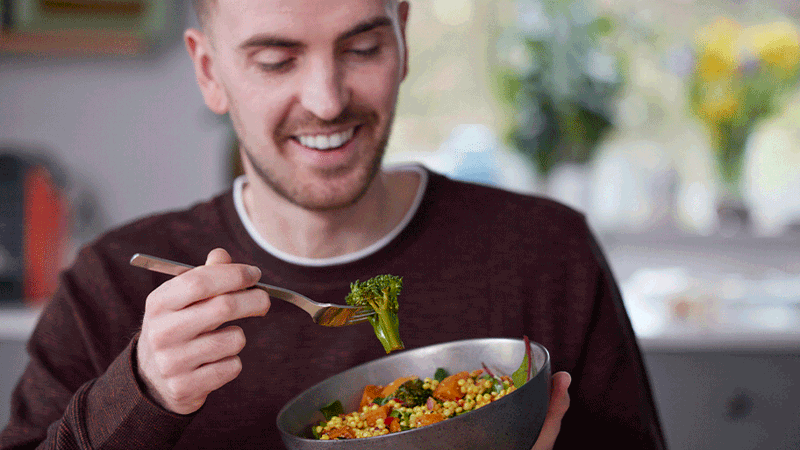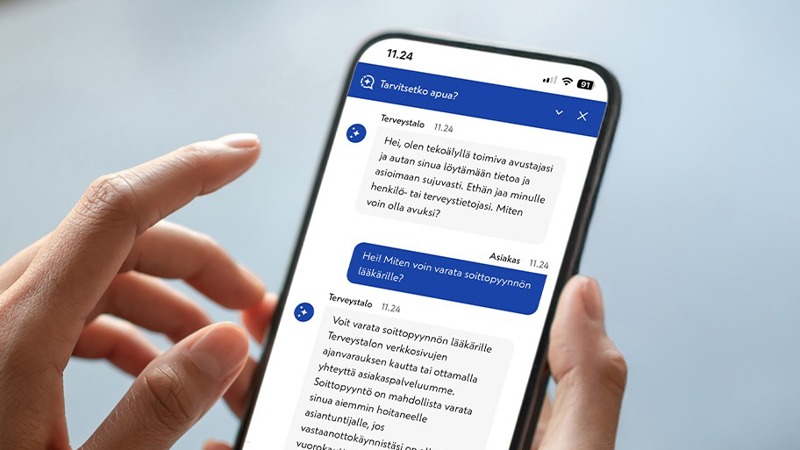8+1 ways to improve your energy levels
Are you tired during the day or do you still have high blood pressure in the evening? Try these tips for a better state of alertness, advises doctor Sanna-Tuulia Mattilan from Terveystalo Focus Uni in Tampere.

1. Regular sleep rhythm
Follow a regular sleep rhythm on both weekdays and weekends. In particular, waking up at the same time in the morning is important to synchronise your internal clock. Aim to get enough sleep.
2. Light lunches and regular eating
"During the working day, have a light lunch, such as a salad or soup, and remember to have an afternoon snack, such as fruit, and drink water.
3. Caffeine
"Several cups of coffee can be consumed during the working day. A few cups of coffee a day are fine for sleep, but avoid caffeine in the afternoon, after 2pm. It's also worth remembering that teas, dark chocolate, and energy drinks and colas also contain caffeine."
4. Vitamin D
"Vitamin D affects alertness and deficiencies are common. A daily dose of 10 micrograms is recommended for adults and 20 micrograms for people over 75 all year round. However, individual requirements vary between 10 and 100 micrograms. Your own vitamin D level can be measured by a laboratory test to tailor the right dose for you."
5. Exercise in a way that suits you
Outdoor exercise, especially in the daylight hours, paces your internal central clock. Avoid strenuous, especially heart rate-raising exercise for a couple of hours before bedtime.
6. Yoga or mindfulness
When recovery is in the right balance, the sympathetic or activating nervous system is able to power through the day. You can maximise what you're doing when you take a break and sleep restfully. But if your activating nervous system stays on, you won't sleep, and you'll feel tired the next day. Yoga and mindfulness exercises lower your circadian rhythms. Doing them during the day is like putting money in the sleep bank for the next night."
7. Daytime naps should be scheduled before 3 p.m
The earlier the better. The maximum appropriate duration is about 20 minutes. Too long a nap eats into the next night's sleep. If it's difficult to settle down to sleep, don't worry about it. Short periods of relaxation throughout the day, just relaxing in place, work just as well. For example, you could try the following: take a deep breath in through your nose and hold it for a few seconds before slowly blowing the air out through your mouth. Do this for a few minutes."
8. Light
Try to be outside in natural light as much as possible. Some people may benefit from a dawn or dusk light or a bright light bulb in the morning. Dim the lights in the evening and set your smart devices to night or dark mode.
+1 Investigate fatigue if necessary
"When a patient comes to my practice with problems with alertness or fatigue, I try to investigate the problem as comprehensively as possible. Investigations include laboratory tests and a mood survey. I will also ask the patient about any viral diseases they have contracted and refer them for sleep tests if necessary. Fatigue affects work performance and quality of life, so it pays to investigate its causes."
Read more occupational health articles

What is metabolic age and why should you care about it?
A new laboratory study by Terveystalo reveals how your body is aging. Metabolic age makes biological aging visible.

Smooth assistance for your needs – our AI assistant is now at your service
You can now find Terveystalo’s AI assistant on our website — a quick and easy way to get answers based on the information available on our site. For now, the assistant is available only on the Finnish‑language section of our website, but you can chat with it in English.

How technology helps relieve mental stress: "When the load is high, the threshold must be low."
Mental health disorders have overtaken musculoskeletal disorders, which had long been the leading cause of sick leave. Work is changing, and the range of sick leave caused by mental health issues has also changed. We must be able to offer new solutions to this challenge.

Extensive data set of 200,000 samples: Nightingale study reveals link between illness risks and sick leave
Data from the Finnish Nightingale study, which is used in Terveystalo's occupational health services, reveals a clear link between lifestyle-related health risks and sick leave. The exceptionally extensive data set of over 200,000 customers shows that people with a low risk of illness had significantly fewer absences, while those in high-risk groups had more absences. The results highlight the importance of preventive healthcare in ensuring work ability and the competitiveness of companies.

Strong identification speeds up your service experience when calling us
Soon you can identify yourself easily and securely before your call is answered. Read below to see how the identification process works.

Terveystalo's digital services have been awarded the internationally recognized ISO27001 information security certification.
Terveystalo's information security practices, processes, and risk management are in line with international best practices.